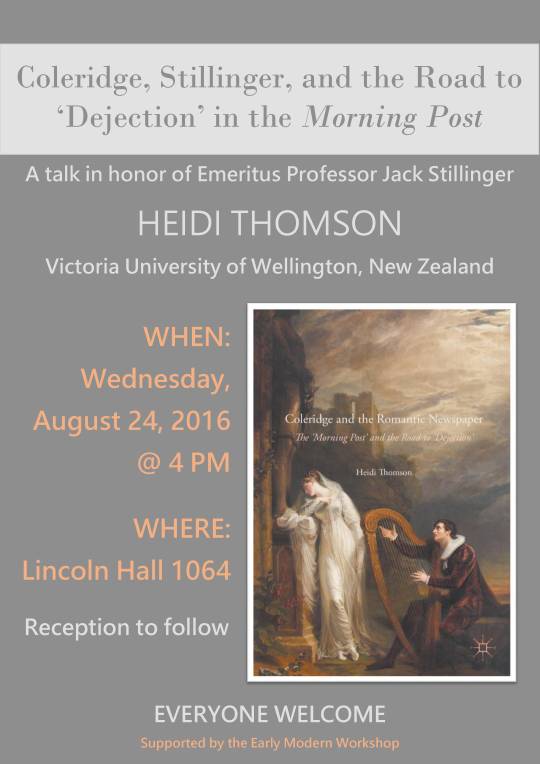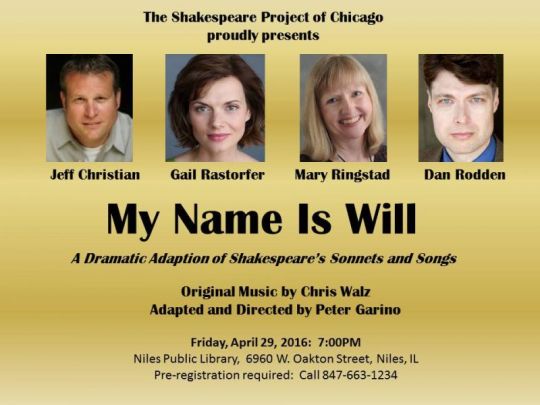Link
BritGrad 2017: Call for Papers
1-3 June 2017
The Shakespeare Institute, University of Birmingham
We invite graduate students with interests in Shakespeare, Reniassance, and Early Modern Studies to submit paper proposals for the Nineteenth Annual British Graduate Shakespeare Conference.
This interdisciplinary conference provides a friendly and stimulating academic forum in which graduate students from all over the world can present their research and meet together in an active centre of Shakespeare research: Shakespeare’s hometown of Stratford-upon-Avon. Attendees will also have the opportunity to attend the RSC production of Julius Caesar, directed by Angus Jackson, at a group-booking price. Lunch will be provided each day, and there will be a party and reception for attendees. Please check our blog for upcoming announcements of plenary speakers as they are confirmed.
We welcome abstracts of up to 200 words proposing papers twenty minutes in length on subjects relating to Shakespeare, Early Modern, and/or Renaissance Studies. More creative forms of criticism, such as original writing or performance, may also be submitted, also requiring a 200-word abstract. The committee also welcomes papers from a wide variety of disciplines, from literature to art and cultural history and beyond. Undergraduate students in their final two years of study are invited to attend the conference as auditors (non-speakers).
Deadline for Paper Proposals: 23:59 GMT on 21 March 2017 and are to be submitted via the email address below.
Presenters will be notified of acceptance in time to register by 21 April and secure any necessary visas. Auditors are encouraged to register by 19 May for early-bird pricing. Due to the growing success of this annual conference, we strongly encourage early registration to ensure a place on the conference programme.
For more information you can find us on Facebook, Twitter, and at britgrad.wordpress.com.
Our email address is [email protected]; please don’t hesitate to get in touch if you have any questions.
1 note
·
View note
Text
NEH: King Lear and Shakespeare Studies
King Lear and Shakespeare Studies: A Seminar for College Teachers
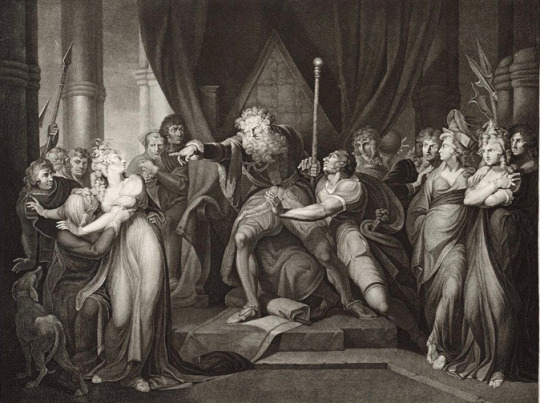
Project Director: Richard Strier
Dates: July 10, 2017 – July 28, 2017
Location: The University of Chicago
Application Deadline: March 1, 2017; notification date: March 31, 2017. See the “How to Apply” tab above.
Stipend Details: Each participant in the Seminar will receive a stipend of $2,700.
Brief Description:
This seminar will provide its participants with the opportunity to spend 3 weeks focusing on the work that many consider Shakespeare’s greatest play, King Lear.
The seminar will attempt to see the play through many lenses: in formal terms; in its historical contexts; and in its life beyond Shakespeare’s time. Since there is so much material on and relevant to King Lear, the seminar will also serve as an introduction to the current state of Shakespeare scholarship and criticism, and to the question of adaptations of Shakespeare, literary and cinematic.
More information can be found here:
https://lucian.uchicago.edu/blogs/neh2017lear/about-the-seminar/
And the application can be found here:
https://lucian.uchicago.edu/blogs/neh2017lear/how-to-apply/
1 note
·
View note
Photo
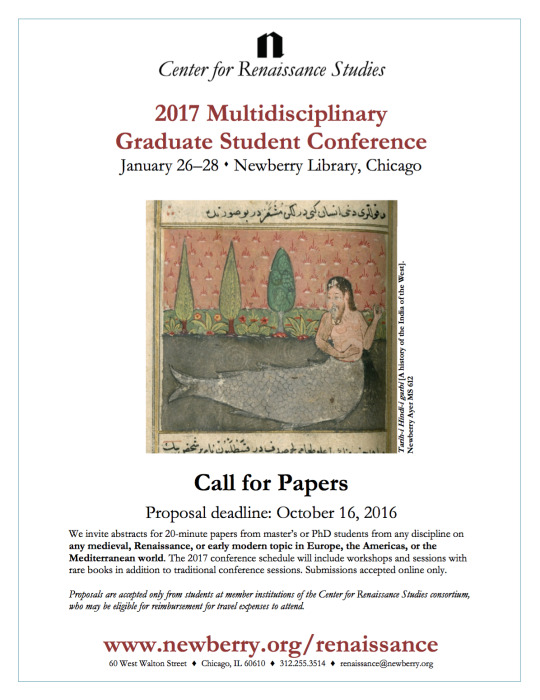
Newberry Center for Renaissance Studies 2017 Multidisciplinary Graduate Student Conference Call for Papers Deadline: Midnight CDT, Sunday, October 16, 2016 Conference dates: January 26-28, 2017 We invite abstracts for 20-minute papers from master's or PhD students from any discipline on any medieval, Renaissance, or early modern topic in Europe, the Americas, or the Mediterranean world. The 2017 conference schedule will include workshops and sessions with rare books in addition to traditional conference sessions. Eligibility: Proposals are accepted only from students at member institutions of the Center for Renaissance Studies consortium, who may be eligible to apply for reimbursement for travel expenses to attend. Submissions are accepted online only: http://www.newberry.org/01262017-2017-multidisciplinary-graduate-student-conference-nlgrad17
1 note
·
View note
Photo
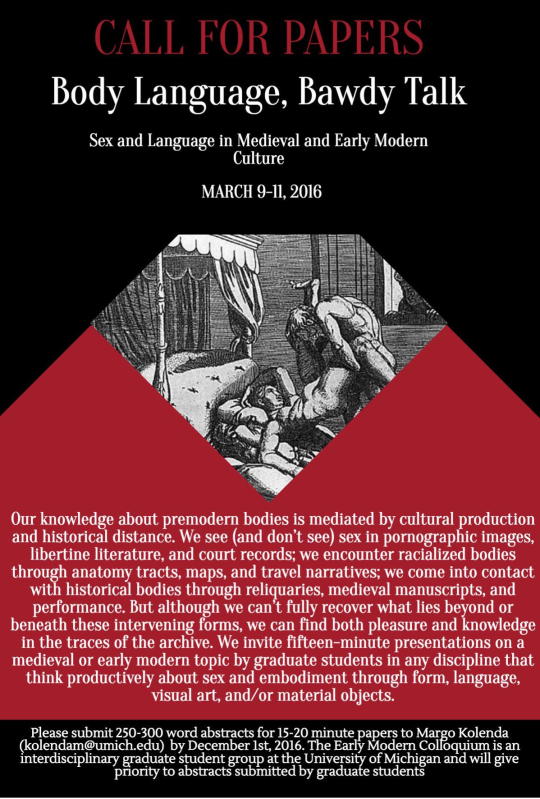
The Early Modern Colloquium at the University of Michigan invites abstracts for papers for their interdisciplinary graduate student conference, "Body Language, Bawdy Talk: Sex and Form in Medieval and Early Modern Culture" at the University of Michigan, Ann Arbor, March 9-11, 2016.
With keynote lectures by: Jeffrey Masten (Northwestern) and Zrinka Stahuljak (UCLA) and panel responses from the medieval and early modern faculty at the University of Michigan.
Our knowledge about premodern bodies is mediated by cultural production and historical distance. We see (and don’t see) sex in pornographic images, libertine literature, and court records; we encounter racialized bodies through anatomy tracts, maps, and travel narratives; we come into contact with historical bodies through reliquaries, medieval manuscripts, and performance. But although we can’t fully recover what lies beyond or beneath these intervening forms, we can find both pleasure and knowledge in the traces of the archive. Jeffrey Masten, for one, approaching this problem in early modern English print culture, argues that “comprehension of sex will require philology.” Similarly, Zrinka Stahuljak looks to language for knowledge about sex in her book Bloodless Genealogies, reading genealogical filiation in medieval French romance as primarily a linguistic phenomenon.
Following the lead of these and other scholars, this conference is an opportunity to consider how thinking about embodiment through form, language, visual art, and material objects might open new avenues for understanding both cultural production and historical experience. Sex and sexuality, while inseparable from language and form, also cannot be understood without inquiry into the historical construction of race, gender, disability, and embodiment, all of which we hope to attend to. In addition, one panel, to be co-sponsored by the University of Michigan's Religion in the Premodern Atlantic Workshop, will focus specifically on the intersections of sex, bodies, and form with premodern religion. We invite fifteen-minute presentations on a medieval or early modern topic by graduate students in any discipline that think productively across two or more of these categories:
* Gender, race, and sexuality
* Language and form
* Sex, desire, and eroticism
* Art, literature, and representation
* Performance and gesture
* Production and reproduction
* Visuality, materiality, and textuality
* Disability and embodiment
* Animals, nature, and ecologies
* Violence, illness, and death
* Religion, faith, and ecstasy
* Travel, globalism and colonialism
* Pain, pleasure, and affect
* Aesthetics, historiography, and method
* State formation and jurisprudence
Please submit 250-300 word abstracts to Margo Kolenda ([email protected] <mailto:[email protected]> ) by December 1, 2016.
0 notes
Text

Newberry Center for Renaissance Studies 2017 Multidisciplinary Graduate Student Conference Call for Papers Deadline: Midnight CDT, Sunday, October 16, 2016 Conference dates: January 26-28, 2017 We invite abstracts for 20-minute papers from master's or PhD students from any discipline on any medieval, Renaissance, or early modern topic in Europe, the Americas, or the Mediterranean world. The 2017 conference schedule will include workshops and sessions with rare books in addition to traditional conference sessions. Eligibility: Proposals are accepted only from students at member institutions of the Center for Renaissance Studies consortium, who may be eligible to apply for reimbursement for travel expenses to attend. Submissions are accepted online only: http://www.newberry.org/01262017-2017-multidisciplinary-graduate-student-conference-nlgrad17 Printable PDF flyer to download and distribute: http://www.newberry.org/sites/default/files/calendar-attachments/2017GradConCFP.pdf Please forward this message to others who may be interested. ~ Faculty and graduate students at member institutions of the Center for Renaissance Studies consortium may be eligible to apply for travel funding to attend this program. For more information: www.newberry.org/newberry-renaissance-consortium-grants The Center for Renaissance Studies at The Newberry www.newberry.org | [email protected]
0 notes
Text

2016-2017 Research Methods Workshops for Early-Career Graduate Students Fall 2016
Application deadline: September 1
Eighteenth-Century ShakespeareFriday, October 14, 2016, 9 am to 5 pm Led by Fiona Ritchie, McGill University Details and online application: http://www.newberry.org/10142016-eighteenth-century-shakespeare Winter/Spring 2017 Application deadline: December 1Text Analysis Tools for Early Modern Literature: The Case of Margaret Cavendish Friday, March 3, 2017, 9 am to 5 pm Led by John Shanahan and Robin Burke, both of DePaul University Details and online application: http://www.newberry.org/03032017-text-analysis-tools-early-modern-literature-case-margaret-cavendish Book History and Early Modern Literary Criticism Saturday, March 11, 2017, 9 am to 5 pm Led by Bryan Brazeau, University of Warwick Details and online application: http://www.newberry.org/03112017-book-history-and-early-modern-literary-criticism-italy For all these programs, students from Center for Renaissance Studies consortium schools ( http://www.newberry.org/center-renaissance-studies-consortium-members) have priority, in accordance with the consortium agreement. Fees are waived for students from consortium institutions. Such students may be eligible to apply for travel funds to attend ( http://www.newberry.org/newberry-renaissance-consortium-grants). Each member university sets its own policies, limitations, and deadlines, and some may limit eligibility to certain departments or units within the institution; contact your Representative Council member in advance for details. The Center for Renaissance Studies at The Newberry www.newberry.org | [email protected]
0 notes
Text
Milton Seminar: "Finding Subjectivity in Paradise Lost"

Milton Seminar: "Finding Subjectivity in Paradise Lost"
Timothy Harrison, University of Chicago Saturday, May 14, 12:00 to 2:30 pm
This scholarly program is free and open to all, but space is limited and registration in advance is required. The format is not a lecture, but discussion of a precirculated paper.
Registrations will be processed through 10 am Friday, May 13. The paper will be sent electronically to those who register using the online form.
Please forward this message to others who may be interested. (Download a printable PDF flyer to post and distribute.)
Faculty and graduate students at member institutions of the Center for Renaissance Studies consortium may be eligible to apply for travel funding to attend this program.
0 notes
Text
Shakespeare's 400th at UIUC
Dear EMW,
There are a number of events happening in the next week celebrating Shakespeare’s 400th anniversary here on campus. Here is a quick digest for your calendars:
1. Exhibit: “O put me in thy books!” - 400 Years off Shakespeare in Fiction (ongoing)
In collaboration with the beautiful exhibit mow on display in the Rare Books and Manuscripts Library, there is also a website that includes video tours, annotated books lists, recommendations, links and more about the reception and reconceptualization of the figure of Shakespeare after his works. For the special exhibit page, visit: http://www.library.illinois.edu/rbx/shakespeare400/.
2. Event: Shakespeare’s Birthday Celebrations, Wednesday, April 20, 4:00PM
Birthday cake, readings, and the American premier of the a shadow puppet show in one act entitled Shakes vs. Shaw are some of the festivities hosted by the UIUC Theatre and Dance departments as well as the Rare Books and manuscripts Library. Events will be hosted in room 346 of the Main Library. (See attached.)
3. Screening: "Shakespeare in Shorts,” Friday, April 22, 12:00PM
This is a lunchtime/brownbag showing of short (mostly funny) portrays of the Bard on film and TV. Taking place in room 106 of the main library, all are welcome and encouraged to bring your lunch with you.
4. Performance: Spoony Bard Shakespeare presents Hamlet, Friday & Saturday, April 22-3, 7:00PM & 2:00PM
A new theatre production company will be opening its inaugural performances of Hamlet at the Channing-Murray Foundation (1209 W Oregon St). Tickets are $5 for students and $8 for non-student adults. For more information and/or to RSVP, see the Facebook event here.
We hope to see you at some of these events next week!
- Michelle & Elizabeth
0 notes
Photo

Check out the American premier of “Shakes vs. Shaw,” a puppet show in one act, at the UIUC Rare Books and Manuscripts Library!
0 notes
Text
Just a reminder that this event this week!
EMW Lecture: The Literariness of Science Studies - A Manifesto
Who: Professor Tita Chico, English Department, University of Maryland
Where: Lincoln Hall 1090
When: 4:00PM, with a reception to follow.
Please join us for the final Early Modern Workshop event of the semester, a lecture given by Professor Tita Chico. She is the author of numerous articles and the book Designing Women: The Dressing Room in Eighteenth-Century English Literature and Culture (2005). She is also co-editor of The Atlantic Worlds of the Long Eighteenth Century: Seduction and Sentiment (2012) and the journal The Eighteenth Century: Theory and Interpretation. Her current book project, Experimentalism: Literary Knowledge and Science in Eighteenth-Century Britain, examines literary celebrations of and alternatives to the epistemology of experimental philosophy.
This event, sponsored by the Early Modern Workshop and the W.D. and Sara E. Trowbridge fund at the University of Illinois at Urbana-Champaign, is free and open to the public.

1 note
·
View note
Text
Fall 2016 Graduate Courses
The following courses may be of interest to UIUC graduate students with research interests in medieval and early modern English literature and culture.
* * *
407 1U/1G INTRO TO OLD ENGLISH, Trilling
TUTH 11-12:15 CRN 49440
Old English is the language spoken and written in England between roughly 500 and 1100 AD, and it offers a window to the past through a wide range of beautiful and evocative texts. In this course, you will encounter the very oldest English literature in its original form—the tales of kings, battles, heroes, monsters and saints that have inspired writers from John Milton to J.R.R. Tolkien. Because Old English is almost like a foreign language to Modern English speakers, the course will begin with intensive work on the basics of Old English grammar and translation practice before we move on to more in-depth study of the literature and culture of Anglo-Saxon England. Please note: This course fulfills the Pre-1800 requirement for English majors, and it may be used to fulfill the language studies elective option for Teaching of English students (with permission from an advisor). Requirements: daily attendance and participation, homework and quizzes, prepared translation, a midterm, and a final. Students taking the course for graduate credit will meet one extra hour per week (time TBD) and will write a seminar paper in addition to the regular course requirements.
416 1U/1G TOPICS IN BRITISH DRAMA TO 1660, Perry
TUTH 2-3:15 CRN 46736
TOPIC: Sex, Vengeance, and the Subjects of Tragedy
Readers familiar only with Shakespeare will be surprised by the tonal complexity and ungenteel-seeming vitality of non-Shakespearean tragedy from the early modern period. Plays by writers like Marlowe, Kyd, Middleton, Ford, and Webster (among others) can be violent, philosophical, crude, satirical, grotesque, sophisticated, horrifying, and hilariously funny by turns, and sometimes all within the same scene. This course will examine the extraordinary experimental energies of early modern drama by focusing upon tragedies depicting the outrageously anti-social: the breaking of sexual taboo (which is in turn the violation of kinship and lineage and so understood as the erasure of patriarchal social order) and the pursuit of vigilante revenge (which is forbidden in the New Testament and imagined as a violation of social norms of communal justice). In learning to read and understand some of the period’s most willfully shocking tragedies, we will pay attention to the way they imagine sexual transgression and the need for vengeance as symptomatic of social breakdown: these are plays about the relationship between political power and subjectivity, as well as about the enfranchisement or otherwise of the political subject. They are also, and above all, wonderfully entertaining and superb to think with.
418 1U/1G SHAKESPEARE, L. Newcomb
TUTH 11-12:15 CRN 40436
This course explores seven Shakespearean plays from a range of dramatic genres. We’ll look especially at the features that made these plays popular in their day: their open staging, their playful language, and their laying bare of the period’s familial, national, gender, and racial tensions. We’ll also consider how the meanings of ‘Shakespeare’ keep multiplying, thanks to the constant, sometimes subversive, reinvention of the plays by literary critics, performers, and adapters world-wide. That diversity compels us to use multiple interpretive frames to look at the plays: close reading; informal staging; film analysis; feminist, historicist, postcolonial, and queer studies critical approaches. Be ready for proactive discussion, performance experiments, a rare-book library visit, and attending at least one Shakespeare play on campus, as well as special events marking 2016 as the 400th anniversary of Shakespeare’s death. Written assignments include informal writings, two focused short papers, a longer paper based on guided research (7-9 pp.), and a final exam. TEXTS: (these print editions are required) Greenblatt et al, eds., Shakespeare: Essential Plays (3rd edition, 2016, ISBN 978-0-393-93863-0); McDonald, ed., Bedford Companion to Shakespeare (2nd edition, 2001, ISBN 978-0312248802); one individual play edition TBA.
429 1U/1G 18th CENTURY FICTION, Pollock
MWF 1 CRN 40392
This course will examine the link between European colonialism and the development of recognizably modern fiction during the course of the long eighteenth century—a period commonly referred to as the Enlightenment—in England, France, and the Americas. We will analyze travel both as a literal means of disseminating “enlightenment” between cultures, and as a metaphor for describing the formation of the “enlightened” person, an idealized subject defined by her/his movement into trans-cultural spaces where complicated ethical and political dilemmas must be negotiated. Indeed, one of the influential legacies of these Enlightenment fictions (or fictions of Enlightenment) has been their formulation of cosmopolitanism as a solution to the often violent clash between cultures. The popular narratives we’ll study test the Enlightenment’s cosmopolitan ethos by imagining European observers in a wide range of locales: Brazil, West Africa, the Caribbean, Persia, the Ottoman Empire, Abyssinia, and Egypt, to name a few. Time permitting, we will finish by reading some recent philosophical work on the question “What is Enlightenment?” and we will attempt to answer that question ourselves. Texts by Montaigne, Behn, Defoe, Montesquieu, Swift, Montagu, Johnson, Voltaire, and Equiano. Requirements: active participation, journal responses, three essay projects, and a final exam.
514 G SEMINAR IN MEDIEVAL LITERATURE, C. Wright
M 3-4:50 CRN 39510
TOPIC: Bibliography and Methods of Medieval Studies
This course is a practical introduction to the bibliography of Medieval Studies, with a focus on Western European textual and iconographic traditions. You will learn about the primary materials and research tools that medievalists use, and the methods and assumptions that enable various historical approaches to medieval texts and cultural artifacts. You will learn how to use the major reference guides, encyclopedias, bibliographies, and electronic databases in order to access medieval historical sources, literary texts, and artistic monuments and to locate the relevant scholarly literature. Representative topics include ecclesiastical history, medieval Latin literature, liturgy, hagiography, biblical exegesis, folklore and popular culture, sciences and encyclopedias, and iconography. Basic reading knowledge of Latin is required.
524 R SEMINAR IN 17th C LIT, Gray
TH 1-250 CRN 30191
TOPIC: John Milton and Seventeenth-Century Literature
Milton was a blind seer, regicidal prose-writer, and influential poet. He also wrote arguably the most ambitious English epic, one that aimed to explain the deep historical origins of human life while also addressing his war-torn contemporary moment, with all its political, affective, and spiritual turbulence. Milton grappled with some of the most controversial issues of his time, including divorce and regicide, while also elaborating ideas that often sit uncomfortably together: he was a censor who argued for restraining censorship, and a zealous anti-Catholic who argued for a limited liberty of conscience. He was known to his contemporaries as both the virginal and self-denying “Lady of Christ’s” and the libertine “Milton the Divorcer.” This course will explore Milton’s prodigious, dense, and often contradictory output, starting with his early verse and polemical prose works and ending with the whole of Paradise Lost. Throughout, we will analyze his work within three main contexts. First, we will consider the armed turmoil of the mid-seventeenth-century civil wars, which raised important questions about political form and national belonging, sex-gender relations and identities, the legitimacy of violence and the ethics of war. Second, we will explore some important seventeenth-century interlocutors for Milton, including the republicans Andrew Marvell and Lucy Hutchinson, the radical sectarians Anna Trapnel and Gerrard Winstanley, and the royalists Hester Pulter and King Charles I himself. Third, we will read scholarship by a range of Miltonists, scholars who bring a diverse array of methods—including feminism, historicism, queer theory, and formalism—to bear on this most challenging of authors.
0 notes
Text
Performance: Spoony Bard’s HAMLET
Celebrate Shakespeare’s 400th birthday by attending his most famous work, Hamlet, and supporting a new theatre production company in the process!
When: Friday, April 22nd at 7pm; Saturday, April 23rd at 2pm and 7pm
Where: The Channing-Murray Foundation at 1209 W Oregon St. Urbana, IL 61801 (above The Red Herring and across from the Foreign Language Building)
What: $5 for Students, $8 for Non-Student Adults
Set in a fictitious, fantastical version of Denmark—not unlike the kingdoms of Disney nightmares or a typical episode of Game of Thrones—young prince Hamlet has assumed a masculine identity in order to someday become fit to be king in this highly patriarchal land, only to have her father die prematurely while she is attending college. Meanwhile, her younger, adopted uncle marries her mother and snatches the kingship from Hamlet before she can even return for her father's funeral. What ensues is a heartrending and thought-provoking tragedy of love, loss, revenge, madness, and an exploration of what drives us to our darkest moments.
For more information and/or to RSVP, see the Facebook event here.

18 notes
·
View notes
Text
EMW Lecture: The Literariness of Science Studies - A Manifesto
Who: Professor Tita Chico, English Department, University of Maryland
Where: Lincoln Hall 1090
When: 4:00PM, with a reception to follow.
Please join us for the final Early Modern Workshop event of the semester, a lecture given by Professor Tita Chico. She is the author of numerous articles and the book Designing Women: The Dressing Room in Eighteenth-Century English Literature and Culture (2005). She is also co-editor of The Atlantic Worlds of the Long Eighteenth Century: Seduction and Sentiment (2012) and the journal The Eighteenth Century: Theory and Interpretation. Her current book project, Experimentalism: Literary Knowledge and Science in Eighteenth-Century Britain, examines literary celebrations of and alternatives to the epistemology of experimental philosophy.
This event, sponsored by the Early Modern Workshop and the W.D. and Sara E. Trowbridge fund at the University of Illinois at Urbana-Champaign, is free and open to the public.

1 note
·
View note
Text
Arkyves Public Workshops and Lectures
Creating the Semantic Web for Visual Cultural Heritage: Digital Humanities, Arkyves, and Iconclass
All events are free and open to the public.
Organizer: Mara R. Wade, Germanic Languages & Literatures Event
Dates: April 8-9, 2016
Please join us for three events that feature Hans Brandhorst, editor of Iconclass (http://www.iconclass.nl/home) and founder of Arkyves (http://arkyves.org/), a reference database for the history of culture. Arkyves is a collection of collections that indexes images and texts through Iconclass, a multi-lingual classification system currently used by the Albertina in Vienna, the Princeton Index of Christian Art, and the Getty Research Institute, among others. Iconclass is designed for describing cultural heritage visual resources including emblem books, medieval manuscript illuminations, Erasmus’ adages, Victorian illustrations, printers’ devices, and early modern typography, in particular decorated and historiated initials, satirical journals from the University of Milan, and the virtual print room (VKK) of the Herzog Anton Ulrich Museum and the Herzog August Bibliothek, totaling some 50,000 graphic prints. Arkyves collaborates with multiple projects, e.g. the German Hygiene Museum, Dresden, for a project of cataloguing AIDS posters.
Schedule of Events
Public Workshop: Searching and Browsing with Arkyves
Friday, 8 April 10:00-11:30; 314 Library
Hans Brandhorst will introduce searching and browsing with Arkyves in this workshop. The UIUC subscribes to Arkyves through the School of Fine and Applied Arts, and it is available to campus via the homepage of Ricker Art and Architecture Library. We wish to make this valuable resource more useful to the campus research community, particularly for projects addressing text/image cultures.
Public Lecture: Iconclass, Arkyves and the use of Iconography Vocabulary Standards to Enhance Access
Friday, 8 April, 4-5 PM, 126 GSLIS, CIRSS Seminar
Hans Brandhorst will provide a brief introduction to Arkyves.org (a Brill online resource) and Iconclass, a classification system designed for art and iconography. As a long-time partner in Emblematica Online (http://emblematica.library.illinois.edu/), Brandhorst will then lead a discussion of how vocabulary standards like Iconclass are applied to enhance discoverability of and access to cultural heritage visual information resources, including early modern emblem books.
Public Workshop: Learning to Index with Iconclass
Saturday, 9 April, 1-5PM, 314 Library
Hans Brandhorst will conduct a hands-on workshop for participants on how to do their own Iconclass indexing. This workshop will have two parts: introduction of Iconclass, followed by practical application. Participants will learn indexing based on a handful of emblems, the genre with which we are most familiar.
Sponsors: These events have received generous financial support from the School for Literature, Culture, and Linguistics; Germanic Languages and Literatures; Krannert Art Museum; French and Italian; Comparative and World Literatures; English; Religious Studies; Spanish and Portuguese; Classics; and Medieval Studies. The University Library and GSLIS have kindly offered the space for these events.
About Hans Brandhorst: As an Art Historian (Leiden University, 1982), Hans Brandhorst works as an independent researcher in iconography. He also works part time for the institutional repository “RePub” at the Library of the Erasmus University, Rotterdam. He has been the co-editor of Iconclass since 1990 and primary editor of Iconclass and Arkyves.org since 2002.
Please email Mara R. Wade ([email protected]) if you plan to attend either of the workshop events in 314 Library. There is no registration but seating for a Public Workshop is limited.
0 notes
Text
Prize: John Edward Kerry & the Malone Society
The Malone Society organizes a competition for graduate students to celebrate the life work of one of our members, the late John Edward Kerry (1924–2008). Postgraduate students who are currently working on any aspect of early modern English drama and using our volumes as part of their research projects are warmly invited to submit a short statement (max. 500 words) to Dr Lucy Munro (Malone Society Publicity Officer – email address: [email protected]) by 23 April 2016.
Those wishing to enter this competition should ensure that their statements explain how their work contributes to the development of scholarship in their fields and in what ways the Malone Society editions have facilitated and supported their research. Statements should also include applicants’ contact details and academic affiliation, the name of the programme of studies being attended and the year of registration, and the name and contacts details of a supervisor or of an academic referee willing to write on their behalf.
The winner of this competition will receive 30 Malone Society volumes and a year’s free membership, which includes three complimentary volumes to be chosen from our backlist together with our current volume. Previous winners include John Kuhn (Columbia University), Amy Bowles (University College London) and Matthew Kubus (Shakespeare Institute, University of Birmingham).
Applicants may also be interested in other Malone Society Fellowships and Research Grants. Further details are here. Please note that holders of these fellowships and bursaries will not be considered for this Prize.
0 notes
